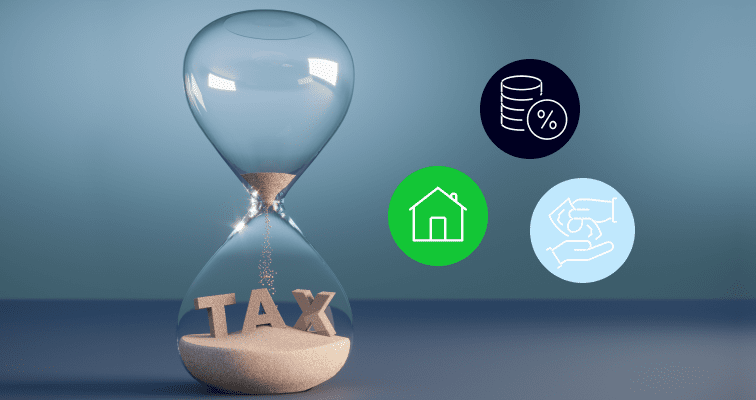Although capital gains tax does not apply in the Netherlands in the same way as in many other European countries, returns made on various investments can still fall into the scope of the Dutch tax system. Discover how to navigate the investment tax landscape in the Netherlands with this guide.
The approach taken by the Dutch Tax and Customs Administration (Belastingdienst) towards tax on
The headline statement that capital gains tax (CGT) does not apply in the Netherlands might trigger a sense of relief among investors. However, this is not the whole picture. Returns made on capital investments in the Netherlands can still fall into the scope of the Dutch tax system.
This guide can help you to navigate how capital assets are taxed in the Netherlands. It explores how to calculate what you owe, and potential ways to minimise the amount you are legally required to pay.
What is capital gains tax (CGT) or wealth tax?

Capital gains tax in the Netherlands is a tax that you pay when you hold capital assets. The scale of this tax charge is calculated by applying a hypothetical fixed rate to your holdings. Different assets have different rates applied to them.
Unlike many other national tax authorities, the Dutch State Ministry of Finance does not levy a tax charge according to the actual profits you made on your trades. Instead, the process considers the
It is your obligation to understand how wealth tax works in the Netherlands. You need to pay tax according to strict guidelines and you may be liable for fines or penalties if you calculate your tax liability incorrectly or fail to pay it at all.
Developing a better understanding of how the Dutch wealth tax works can not only help you to gain the confidence that you are complying with regulations, but can also present you with opportunities to reduce your overall tax burden.
What assets have wealth tax?
The starting point for your tax analysis is establishing which of your investments fall into the scope of the Dutch wealth tax system. While not an exhaustive list, investors and savers in the Netherlands will usually have to pay tax on the following assets:
- Shares, units and similar investments
- Dividends
- Savings accounts
- Bonds
- Cryptoassets
- Currency trades
- Second homes
- Property leases
- Rental income
- Endowment insurance policies that are not linked to an owner-occupied dwelling
At the other end of the spectrum are assets that do not fall into the scope of the Dutch wealth tax. This list of assets may include:
- Assets that are already taxed in other areas of the tax system. These are referred to as Box 1 or Box 2 assets.
- Movable property associated with personal use — for example, your car
- Green investments such as woodlands (investment amounts are capped)
- Artworks that are not bought as an investment
The wealth tax applies to both foreign and local citizens. Anyone domiciled in the Netherlands needs to ensure that they comply with the filing and payment requirements.
Tip: Double tax treaties may apply to foreign citizens. Research to ensure that tax on assets is paid only once.
If you are an active trader or investor, or have a diversified portfolio, it may be wise to get help from an experienced tax advisor to ensure that you do not avoid any of your tax liabilities.
How does wealth tax impact my other investments?

Dutch wealth tax directly impacts your investments by diminishing your wealth if your assets
Taking an overly conservative approach and generating returns below the tax authority’s hypothetical rates is a losing strategy. Conversely, escalating risk may not be the solution, as losses in a tax year still result in wealth tax on the initial notional amount.
Sensible investing is encouraged under the Dutch wealth tax system, where, in a good year, returns exceeding the hypothetical tax rate can mitigate the risk of facing both negative investment returns, and unfavourable taxation.
Allocating capital to different asset groups is one option to manage your risk and approach tax strategically. For instance, cash savings face a 1.03% annual wealth tax, but finding a savings account with a higher return can offset this. On the other hand, shareholdings, which are taxed at 6.04%, may lead to depreciation if the annual return is below the wealth tax levy.
Strategic planning should consider that riskier assets may need longer holding periods. While stocks on the Amsterdam Stock Exchange can experience short-term
For instance, the iShares AEX UCITS ETF, which tracks the performance of the AEX, has shown an annual return of 6.3% over the last three years (as of January 2024), surpassing the 6.04% tax rate. When calculated over a 10-year period, the ETF’s annual return rises to 9.31%, supporting the notion of considering longer-term holding for riskier assets.
How do I calculate my wealth tax?
For tax filings, make sure that you keep details of:
- Share dealing transactions
- Charges relating to any money you borrowed to finance capital investments
- Statements detailing brokerage fees
- Accounting and legal costs
- Valuations, especially of illiquid assets
- Property maintenance and modification costs
- Statements relating to business costs
Calculating Dutch wealth tax involves establishing which assets need to be included in the capital assets area of your assessment. The Dutch tax filing protocols break income down into three groups, called boxes:
| Box 1: | Includes employment income, business profits, overseas earnings, and income from a primary residence. |
| Box 2: | Applies to fewer people, and includes assets described as “substantial interests,” meaning instances where you and a tax partner together own at least 5% of the shares, options or profit-sharing certificates in a company. |
| Box 3: | Applies to capital assets and wealth tax. Assets in Box 3 are subdivided into three groups: savings, investments and debts. Each subdivision is subject to a different tax rate; 1.03%, 6.04%, and 2.47%, respectively. |
Before illustrating how wealth tax is calculated in the Netherlands, consider the tax-free allowance and the impact of debts on the final calculation. Each citizen receives a capital yield tax allowance of €57,000, which doubles to €114,000 with a tax partner.
Not all assets are subject to wealth tax, and debts, up to €3,200 per person, can reduce total assets.
Tip: It has been reported that the Dutch approach to capital gains will soon change, introducing a new CGT-specific regime.
How can I minimise my wealth tax burden?

The straightforward and transparent nature of wealth tax on capital gains in the Netherlands presents relatively few opportunities for ways to avoid paying it.
As the projected tax you will be likely to pay is calculated using the notional value of your assets on the first day of the calendar year, any efforts to reduce the liability must be put into motion some time in advance.
Invest in eco-projects
The tax break on green investments is one way for investors to simultaneously reduce their wealth tax burden and satisfy a desire to back projects they feel passionate about. Green funds (Groenfonds) are offered by a range of banks and brokers. However, if your primary objective is to pay less wealth tax, you will need to ensure that the product you buy is eligible for a Green Declaration (Groenverklaring).
There are a wide range of sectors that qualify for the green funds tax discount, including various commodities, nature, sustainable agriculture, circular economy, sustainable energy, construction, sustainable transportation and climate adaptation. Investors can access a database of projects, managed by the Netherlands Enterprise Agency.
Invest in your pension
Any capital held in a Dutch Private Pension Plan is exempt from Dutch Box 3 wealth taxation.
Speak to a professional
An experienced tax agent can provide personalised advice on how to best manage your wealth tax liability. Tax avoidance is illegal, but an expert can help you to manage your liabilities without crossing this line.
Final thoughts
The Box 3 wealth tax is an unavoidable part of being an investor in the Netherlands. Reports that the current system may be overhauled mean that you must not only understand your obligations now, but also monitor developments to establish how any new protocols could affect your wealth in the future. Once you have a clearer understanding of how wealth tax works, this knowledge can be incorporated into your strategy planning and help you on your way to gaining financial freedom.
Join eToro today and learn more about wealth tax, investing in shares and trading in general.
FAQs
- What is the best way to keep track of my transactions and statements?
-
The financial institutions that hold your investments will be set up to provide reports detailing your transactions and capital holdings. If you’re using an online broker, this information will be contained in the account reporting area of the platform. Choosing your broker wisely can help you to save time and give you more confidence, as some provide more support than others, and ideally they will offer you ready-made tax statements as part of their service.
- How often do Dutch wealth tax rates change?
-
The tax rates at which wealth tax is applied in the Netherlands tend to change each year. This is because interest rates that affect savings returns, and overall stock market performance, vary in line with macroeconomic trends. The tax authority sets its rates in line with those broader developments and projected changes in government spending.
- Is a CGT-style regime going to replace the current wealth tax system in the Netherlands?
-
For some time, there have been reports that the Dutch tax authorities will at some point shift from using a wealth tax approach to one that taxes actual returns. When this happens, the Netherlands will come in line with a lot of other major economies that already take a CGT-specific approach. The timeline of this change will be influenced by political factors and election results.
This information is for educational purposes only and should not be taken as investment advice, personal recommendation, or an offer of, or solicitation to, buy or sell any financial instruments.
This material has been prepared without regard to any particular investment objectives or financial situation and has not been prepared in accordance with the legal and regulatory requirements to promote independent research. Not all of the financial instruments and services referred to are offered by eToro and any references to past performance of a financial instrument, index, or a packaged investment product are not, and should not be taken as, a reliable indicator of future results.
eToro makes no representation and assumes no liability as to the accuracy or completeness of the content of this guide. Make sure you understand the risks involved in trading before committing any capital. Never risk more than you are prepared to lose.
eToro does not provide tax advice and the information provided should not be interpreted as such. Customers should seek independent tax advice.
CFDs are complex instruments and come with a high risk of losing money rapidly due to leverage. 51% of retail investor accounts lose money when trading CFDs with this provider. You should consider whether you understand how CFDs work and whether you can afford to take the high risk of losing your money.
Cryptoasset investing is highly volatile and unregulated in some EU countries. No consumer protection. Tax on profits may apply.


